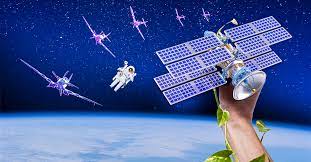The vast expanse of space has always intrigued humanity, and with each passing day, innovations in aerospace technology propel us closer to the realization of space colonization. From groundbreaking advancements in propulsion systems to cutting-edge space habitats, the landscape of space exploration is undergoing a revolutionary transformation. In this article, we will explore the latest innovations in aerospace technology and their implications for the future of space colonization.
**1. Advancements in Propulsion Systems
One of the key enablers of space exploration is the development of advanced propulsion systems. Traditional chemical rockets have been the workhorses of space missions, but innovations like ion propulsion and nuclear thermal propulsion promise to revolutionize travel within our solar system. These technologies offer increased efficiency and reduced travel times, laying the groundwork for more ambitious space exploration missions.
**2. Reusable Rocket Technology
The advent of reusable rocket technology has ushered in a new era of cost-effective space travel. Companies like SpaceX have successfully demonstrated the viability of recovering and reusing rocket components, significantly lowering the financial barriers to space exploration. Reusable rockets pave the way for more frequent launches, fostering a sustainable approach to space activities.
**3. Advances in Spacecraft Design
Modern spacecraft are undergoing transformative changes in design and functionality. From streamlined shapes for optimal aerodynamics to modular architectures that allow for easier upgrades and repairs, spacecraft design is becoming more adaptable and efficient. These innovations enhance the overall reliability and longevity of space missions.
**4. Breakthroughs in Life Support Systems
Sustaining human life in the hostile environment of space is a critical aspect of space colonization. Innovations in life support systems, including advanced recycling of air and water, closed-loop ecological systems, and efficient waste management, are addressing the challenges of long-duration space missions and forming the basis for future colonization efforts.
**5. Space Habitats and Colonization Concepts
The concept of space habitats and colonies is no longer confined to science fiction. Ongoing research and development projects explore the construction of habitats in space, such as orbital space stations and lunar bases. These habitats aim to provide a safe and sustainable environment for humans, fostering the possibility of establishing a human presence beyond Earth.
**6. Autonomous Space Exploration
Advancements in artificial intelligence (AI) and autonomous systems are transforming the way we explore space. Autonomous spacecraft equipped with intelligent navigation and decision-making capabilities can conduct intricate missions without constant human intervention. This innovation is crucial for the efficiency and success of long-term space exploration endeavors.
**7. In-Situ Resource Utilization (ISRU)
In the quest for sustainability in space, ISRU plays a pivotal role. The ability to extract and utilize resources from celestial bodies, such as the Moon or Mars, reduces the reliance on Earth for essential supplies. ISRU technologies encompass extracting water from lunar ice, mining minerals, and generating fuel, contributing to the feasibility of extended space missions and colonization.
**8. Space Tourism and Commercial Space Ventures
The emergence of commercial space ventures and space tourism is transforming space exploration into a more accessible frontier. Companies like Blue Origin and Virgin Galactic are working on making space travel a reality for private individuals. This shift not only broadens participation in space activities but also contributes to the funding of more ambitious projects.
**9. Interplanetary Internet Connectivity
As humanity expands its reach into space, the need for reliable communication becomes increasingly vital. Interplanetary internet connectivity aims to provide seamless communication between Earth and distant spacecraft, facilitating real-time data transmission and control. This innovation is integral to the coordination and management of future space missions.
**10. International Collaboration in Space Exploration
The future of space exploration is marked by global collaboration. International partnerships bring together the expertise and resources of multiple nations, fostering shared goals and objectives. Collaborative efforts pave the way for more comprehensive and ambitious space exploration missions, including the eventual colonization of other celestial bodies.
Conclusion
Innovations in aerospace technology are propelling humanity toward an exciting era of space exploration and potential colonization. From advancements in propulsion systems to the development of sustainable life support systems, each breakthrough brings us closer to realizing the dream of establishing a human presence beyond Earth. As international collaboration and private sector involvement continue to drive innovation, the future of space exploration appears brighter than ever.
FAQs
- How do reusable rockets contribute to the future of space exploration?
- Reusable rockets reduce the cost of space travel, making it more economically feasible and facilitating more frequent launches.
- What role does in-situ resource utilization (ISRU) play in space colonization?
- ISRU allows for the extraction and utilization of resources from celestial bodies, reducing the reliance on Earth for essential supplies during space missions and colonization.
- How are advancements in artificial intelligence impacting space exploration?
- Advancements in artificial intelligence enable autonomous spacecraft with intelligent navigation and decision-making capabilities, enhancing the efficiency and success of space missions.
- What are the key challenges in sustaining human life in space habitats?
- Challenges in sustaining human life include developing efficient life support systems, closed-loop ecological systems, and addressing the psychological and physiological impacts of long-duration space travel.
- How is international collaboration shaping the future of space exploration?
- International collaboration brings together the expertise and resources of multiple nations, fostering shared goals and objectives for more comprehensive and ambitious space exploration missions.
